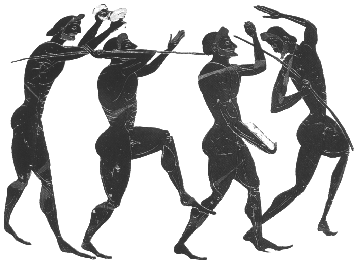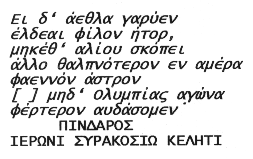

look for no stars of day
that shines more warmly that the sun
/..../ nor any contest mightier than Olympia.
PINDAR "In honour of Ieron of Syracuse, the horseman".
The area of Olympia and the sanctuary, situated on the western Peloponnese, were named after the mountain Olympos in Thessaly where it was believed that it was the residence of gods.
Ancient Greeks also believed that the Olympian gods inaugurated the games at Olympia and that Heracles was the one who organized the first track events. As the matter of fact he crowned the winnor with a "kotinos" which was a branch of wild olive from the tree he himself had planted at Olympia.
Heracles also determined the site and size of the first stadium and established the first foot race which started from a line (apheses) which was defined by a grooved marble inlay.
Olympia became a religious centre under the protection of Zeus. The sanctuary of Olympia was quickly recognized throughout Greece as the paramount competitive religious centre famed throughout the then-known world. During the Olympic Games, the Sacred Truce was declared and all the wars and the hostilities among the Greek cities-states were suspended for a month.
The first Olympiad was held in 776 BC. The games were held every fifth year and from Classical times onwards lasted five days. The intervening four-year period was called an Olympiad. Although the exact dates of the games are not known, it is known that they were organized during the aestival full-moon, between the interval of the last week of July and the first half of August.
So significant were the games at Olympia in the life of the ancient Greeks that they used the Olympiads as the main basis of dating all the events in their history.
A year before the beginning of the new Olympiad the officials of Elis responsible for the games sent heralds (spondophoroi) to all Greek cities-states and to all Greek colonies as well [from the Pillars of Hercules to Magna Graecia, Asia Minor, the Euxine Pontus (Black Sea) and the Maiotis Lake (Sea of Azov)]. The heralds were charged with announcing the date of the opening of the games and therefore of inaugurating the Sacred Truce among the Greek cities-states.
The cities-states were represented at Olympia not only by the athletes they sent but also by official emissaries, the theoroi. Many events took also place such as speeches by orators, historians and philosophers.
Women were not allowed to participate. It was a great honour to become a winnor of "kotinos" and it is well known a story of a father who died in full happiness because he experienced saw his two sons winning the "kotinos" in two different games in the same Olympiad.
The games were the following:
Horse races, chariot races (track events), running, the pentathlon (incl. throwing disks), boxing and wrestling.
In AD 393, Theodosius I, emperor of the Byzantium, issued a decree forbidding the games. The institution of the Olympic Games was revived in 1896 by Baron Coubertin, with the support and decisive support of Demetrios Vikelas.
Apart from the interval of the two World Wars, the games have been held every four years in one of the world’s major cities, with the participation of athletes from all countries.
But it was at Olympia more than anywhere else that bodily strength and the intellect were worshipped: "A healthy mind in a healthy body" and it is still there that the Olympic Flame lights for its internal spirit being delivered